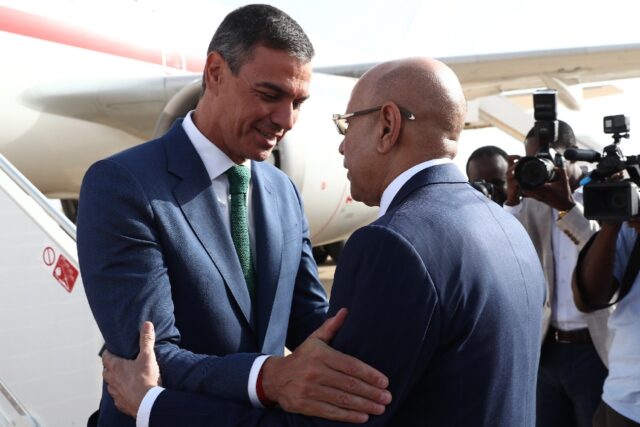Spain has signed agreements with Mauritania and The Gambia to strengthen cooperation to combat people smuggling and promote legal migration, as Spanish Prime Minister Pedro Sanchez visits West Africa in the face of surging migrant arrivals.
Spain signed bilateral memorandums of understanding on “circular migration” with Mauritania on Tuesday evening and The Gambia on Wednesday.
The texts establish a framework for regular entry into Spain based on labour needs, with an emphasis on young people and women.
Sanchez arrived in Senegal’s capital Dakar on Wednesday evening for the third and final leg of his three-day tour, attending an event showcasing collaboration projects at Spain’s Cervantes Institute.
“We want to be close like friends and partners, working alongside each other in areas that are very important for both our societies,” Sanchez said during the event.
“In peace, security, sustainable development, in inclusive and resilient growth to achieve orderly, safe and regular mobility, which is one of the shared challenges that our societies face,” he said.
The Spanish leader is due to meet with Senegal’s President Bassirou Diomaye Faye on Thursday.
Earlier in the tour, Spain signed agreements with both Mauritania and The Gambia to strengthen cooperation against organised crime.
During a meeting with Mauritanian President Mohamed Ould Cheikh El Ghazouani, Sanchez said the main aim was to combat human trafficking, Mauritania’s national news agency reported.
Nearly every day, Spain’s coastguard rescues a boat carrying dozens of African migrants towards the Canary Islands off the northwest coast of Africa.
The Atlantic route is perilous due to the strong currents, with thousands of deaths and disappearances every year on overloaded, often unseaworthy boats.
Mauritania, The Gambia and Senegal are key departure points for a large proportion of the boats.
Madrid estimates there are some 200,000 people in Mauritania waiting to make the crossing to the Canaries.
‘Immigration is not a problem’
Between January 1 and August 15 this year, 22,304 migrants reached the islands, compared with 9,864 in the same period in 2023 — an increase of 126 percent, according to interior ministry figures.
Across all of Spain, there were 31,155 arrivals up to mid-August, a 66.2-percent increase on the 18,745 a year earlier.
Spain has signed joint declarations with Mauritania and The Gambia expressing their commitment to promote “safe, orderly and regular migration”.
On Tuesday evening, Sanchez stressed the importance of fighting against illegal people smugglers and managing migration in a “humane, safe and orderly way”.
“Not so long ago, Spain was also a country of migrants,” he said, adding that “immigration is not a problem, but a necessity that comes with certain problems”.
“We must fight against the mafias that trade in human beings and play with human lives,” and those who “take advantage of the terrible conditions and desperation of those who resort to irregular migration,” Sanchez said, as reported by Mauritania’s news agency.
Since 2014 at least 4,857 people have died or disappeared while trying to reach the Canary Islands, according to the UN’s International Organization for Migration (IOM).
Priority regions
Spain’s circular migration pilot project with Mauritania will initially last one year, with the European country communicating job offers to Mauritania, which will select candidates for work.
Candidates will undergo interviews and, if necessary, tests, obtain a visa, sign a contract and agree to return to their country at the end of the contract.
The memorandum does not provide a figure for potential offers.
Spain has already applied the approach “successfully” with other countries, Sanchez said.
The Spanish prime minister also pledged “half a million euros to a defence and security training initiative in Mauritania” and the launching of a Cervantes Institute to promote the Spanish language and culture.
Sanchez said he wanted to give new impetus to Spain’s relations with Africa during his trip to the Gambian capital Banjul, where he was making the first official visit by a Spanish head of government since the establishment of bilateral relations.
He visited Spanish Guardia Civil and police officers deployed at the port of Banjul in the name of cooperation on migration and anti-trafficking.
Sanchez vowed that Spain would launch a new strategy for relations with Africa in the coming weeks, indicating that West Africa and the Sahel would be considered priority regions.
hos-lal-mrb-acc/giv

COMMENTS
Please let us know if you're having issues with commenting.